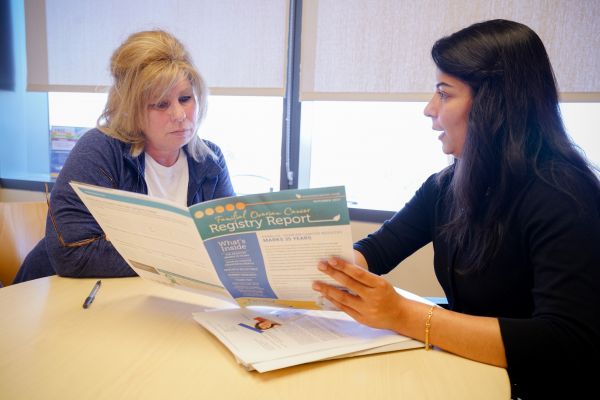Ovarian cancer is the second most common type of gynecological cancer, but it is also the most lethal because it is usually detected at later stages when it is more difficult to treat, which is why early detection is so important.
Am I at Risk for Ovarian Cancer?
While we are still working to fully understand the underlying causes and risk factors for ovarian cancer, there are some red flags that you can use to understand if you may be at elevated risk. Take a minute to answer the questions below.
1. Do you have a personal history of breast cancer before the age of 40?
2. Have any of your male relatives had breast cancer?
3. Do you have a personal or family history of ovarian, fallopian tube, or primary peritoneal cancer in a first or second-degree blood relative (mother, sister, grandmother)?
4. Do you have a family history of hereditary non-polyposis colorectal cancer (Lynch syndrome) in a first- or second-degree relative?
5. Are you of Ashkenazi Jewish descent and have a personal history of breast cancer or a first- or second-degree relative with breast or ovarian cancer?
6. In the past month, have you experienced one or more of these symptoms daily for at least two weeks: bloating or sudden weight loss, pelvic or abdominal pain, urinary frequency, indigestion or feeling full quickly after you begin eating, or pelvic pressure?
6. Do you have a personal or family history of a BRCA mutation?
If you answered yes to any of these questions, you may be at an increased risk for developing ovarian cancer. With the lack of a screening test for ovarian cancer, knowing your personal risk level is the best way to take steps to prevent developing this disease.
If you are concerned about your risk based on your answers, you should talk to your doctor. Make sure your family and personal history is documented, and read up on ovarian cancer symptoms and ways to reduce your risk. If you still have concerns, call us here at Roswell Park and ask about a consultation with one of our Gynecologic Oncologists. We can help you better understand your personal risk level and the steps you should be taking. For women who have strong family histories but have had negative BRCA testing in the past, there are new genetic tests available to help identify other genes that may predispose you to ovarian cancer. We can work with you to get the most up to date testing available.
Understand your risk for ovarian cancer
Are you at risk for ovarian cancer? Fill out our online risk assessment form.
Learn More
